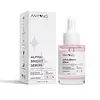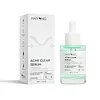What's inside
What's inside
 Key Ingredients
Key Ingredients

 Benefits
Benefits

 Concerns
Concerns

 Ingredients Side-by-side
Ingredients Side-by-side

Water
Skin ConditioningOryza Sativa Bran Water
MaskingNiacinamide
SmoothingSaccharomyces/Rice Ferment Filtrate Extract
AntioxidantTranexamic Acid
AstringentPropylene Glycol
HumectantAlpha-Arbutin
AntioxidantAloe Barbadensis Leaf Juice
Skin ConditioningVaccinium Myrtillus Fruit Extract
Skin ConditioningSodium Hyaluronate
HumectantGlycyrrhiza Glabra Root Extract
BleachingPanthenol
Skin ConditioningInulin
Skin ConditioningFructose
HumectantHydroxyethylcellulose
Emulsion StabilisingTranexamoyl Dipeptide-23
BleachingEthylhexylglycerin
Skin ConditioningCaprylyl Glycol
Emollient1,2-Hexanediol
Skin ConditioningPentylene Glycol
Skin ConditioningWater, Oryza Sativa Bran Water, Niacinamide, Saccharomyces/Rice Ferment Filtrate Extract, Tranexamic Acid, Propylene Glycol, Alpha-Arbutin, Aloe Barbadensis Leaf Juice, Vaccinium Myrtillus Fruit Extract, Sodium Hyaluronate, Glycyrrhiza Glabra Root Extract, Panthenol, Inulin, Fructose, Hydroxyethylcellulose, Tranexamoyl Dipeptide-23, Ethylhexylglycerin, Caprylyl Glycol, 1,2-Hexanediol, Pentylene Glycol
Water
Skin ConditioningCentella Asiatica Leaf Extract
Skin ConditioningBacillus
Skin ConditioningAzelaic Acid
BufferingPropylene Glycol
HumectantAloe Barbadensis Leaf Juice
Skin ConditioningSodium Hyaluronate
HumectantPentylene Glycol
Skin ConditioningSalix Alba Bark Extract
AstringentPanthenol
Skin ConditioningMadecassic Acid
Skin ConditioningAsiaticoside
AntioxidantAsiatic Acid
Skin ConditioningInulin
Skin ConditioningFructose
HumectantHydroxyethylcellulose
Emulsion Stabilising1,2-Hexanediol
Skin ConditioningCaprylyl Glycol
EmollientSorbitol
HumectantSpirulina Platensis Extract
Skin ProtectingPotassium Sorbate
PreservativeEthylhexylglycerin
Skin ConditioningWater, Centella Asiatica Leaf Extract, Bacillus, Azelaic Acid, Propylene Glycol, Aloe Barbadensis Leaf Juice, Sodium Hyaluronate, Pentylene Glycol, Salix Alba Bark Extract, Panthenol, Madecassic Acid, Asiaticoside, Asiatic Acid, Inulin, Fructose, Hydroxyethylcellulose, 1,2-Hexanediol, Caprylyl Glycol, Sorbitol, Spirulina Platensis Extract, Potassium Sorbate, Ethylhexylglycerin
 Reviews
Reviews

Ingredients Explained
These ingredients are found in both products.
Ingredients higher up in an ingredient list are typically present in a larger amount.
1,2-Hexanediol is a synthetic liquid and another multi-functional powerhouse.
It is a:
- Humectant, drawing moisture into the skin
- Emollient, helping to soften skin
- Solvent, dispersing and stabilizing formulas
- Preservative booster, enhancing the antimicrobial activity of other preservatives
Aloe Barbadensis Leaf Juice comes from leaves of the aloe plant. Aloe Barbadensis Leaf Juice is best known for helping to soothe sunburns. It is also anti-inflammatory, moisturizing, antiseptic, and can help heal wounds.
Aloe is packed with good stuff including Vitamins A, C, and E. These vitamins are antioxidants, which help fight free-radicals and the damage they may cause. Free-radicals are molecules that may damage your skin cells, such as pollution.
Aloe Barbadensis Leaf Juice also contains sugars. These sugars come in the form of monosaccharides and polysaccharides, folic acid, and choline. These sugars are able to help bind moisture to skin.
It also contains minerals such as calcium, 12 anthraquinones, fatty acids, amino acids, and Vitamin B12.
Learn more about Aloe Barbadensis Leaf JuiceCaprylyl Glycol is a humectant and emollient, meaning it attracts and preserves moisture.
It is a common ingredient in many products, especially those designed to hydrate skin. The primary benefits are retaining moisture, skin softening, and promoting a healthy skin barrier.
Though Caprylyl Glycol is an alcohol derived from fatty acids, it is not the kind that can dry out skin.
This ingredient is also used as a preservative to extend the life of products. It has slight antimicrobial properties.
Learn more about Caprylyl GlycolEthylhexylglycerin (we can't pronounce this either) is commonly used as a preservative and skin softener. It is derived from glyceryl.
You might see Ethylhexylglycerin often paired with other preservatives such as phenoxyethanol. Ethylhexylglycerin has been found to increase the effectiveness of these other preservatives.
Hydroxyethylcellulose is used to improve the texture of products. It is created from a chemical reaction involving ethylene oxide and alkali-cellulose. Cellulose is a sugar found in plant cell walls and help give plants structure.
This ingredient helps stabilize products by preventing ingredients from separating. It can also help thicken the texture of a product.
This ingredient can also be found in pill medicines to help our bodies digest other ingredients.
Learn more about HydroxyethylcelluloseInulin is a polysaccharide (carbohydrate) with prebiotic and antioxidant properties.
The majority of inulin is extracted from chicory, but can also be obtained from other plants such as garlic, onion, asparagus, and sugarcane.
Studies show inulin may help with controlling your skin's natural microbiota when applied topically.
The antioxidant potential of inulin varies depending on the source.
Learn more about InulinPanthenol is a common ingredient that helps hydrate and soothe the skin. It is found naturally in our skin and hair.
There are two forms of panthenol: D and L.
D-panthenol is also known as dexpanthenol. Most cosmetics use dexpanthenol or a mixture of D and L-panthenol.
Panthenol is famous due to its ability to go deeper into the skin's layers. Using this ingredient has numerous pros (and no cons):
Like hyaluronic acid, panthenol is a humectant. Humectants are able to bind and hold large amounts of water to keep skin hydrated.
This ingredient works well for wound healing. It works by increasing tissue in the wound and helps close open wounds.
Once oxidized, panthenol converts to pantothenic acid. Panthothenic acid is found in all living cells.
This ingredient is also referred to as pro-vitamin B5.
Learn more about PanthenolPentylene glycol is typically used within a product to thicken it. It also adds a smooth, soft, and moisturizing feel to the product. It is naturally found in plants such as sugar beets.
The hydrophilic trait of Pentylene Glycol makes it a humectant. As a humectant, Pentylene Glycol helps draw moisture from the air to your skin. This can help keep your skin hydrated.
This property also makes Pentylene Glycol a great texture enhancer. It can also help thicken or stabilize a product.
Pentylene Glycol also acts as a mild preservative and helps to keep a product microbe-free.
Some people may experience mild eye and skin irritation from Pentylene Glycol. We always recommend speaking with a professional about using this ingredient in your routine.
Pentylene Glycol has a low molecular weight and is part of the 1,2-glycol family.
Learn more about Pentylene GlycolPropylene Glycol is an odorless, colorless liquid. As a humectant, it helps skin retain moisture. It also aids in delivering active ingredients.
Another role of this ingredient is preventing a product from melting or freezing. Propylene glycol also adds antimicrobrial properties to a product, elongating product lifespan.
This ingredient is considered an organic alcohol and commonly added into both cosmetics and foods.
Those with sensitive skin or conditions may develop a rash when using this ingredient.
Learn more about Propylene GlycolSodium Hyaluronate is hyaluronic acid's salt form. It is commonly derived from the sodium salt of hyaluronic acid.
Like hyaluronic acid, it is great at holding water and acts as a humectant. This makes it a great skin hydrating ingredient.
Sodium Hyaluronate is naturally occurring in our bodies and is mostly found in eye fluid and joints.
These are some other common types of Hyaluronic Acid:
Learn more about Sodium HyaluronateWater. It's the most common cosmetic ingredient of all. You'll usually see it at the top of ingredient lists, meaning that it makes up the largest part of the product.
So why is it so popular? Water most often acts as a solvent - this means that it helps dissolve other ingredients into the formulation.
You'll also recognize water as that liquid we all need to stay alive. If you see this, drink a glass of water. Stay hydrated!
Learn more about Water